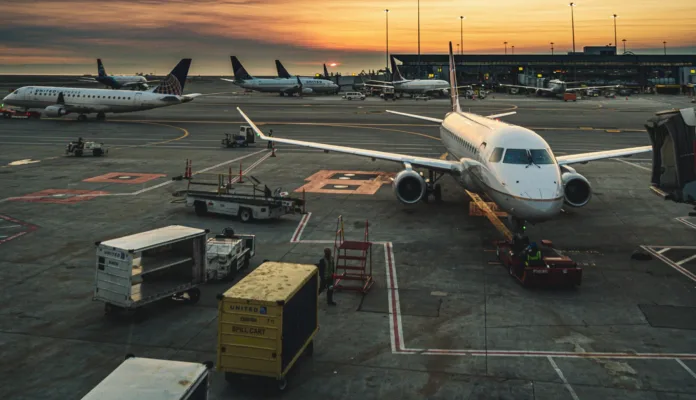Saudi Arabia airport privatisation: Accelerating efforts in logistics and transport to boost foreign investment under Vision 2030
Saudi Arabia is advancing its airport privatisation strategy by preparing to appoint private operators to manage four of its airports in the coming months. This announcement was made by Saudi Investment Minister Khalid Al-Falih during the Global Logistics Forum in Riyadh on 13 October 2024. This initiative is part of a broader plan to decrease the government’s direct involvement in business operations while empowering private entities in critical sectors like logistics and transport.
Al-Falih’s announcement comes at a time when Saudi Arabia is striving to transform itself into a strategic logistics hub, bridging three continents—Asia, Europe, and Africa. The country’s National Logistics Strategy aims to increase the logistics sector’s contribution to its gross domestic product (GDP) from 6 per cent to 10 per cent by 2030, a cornerstone of the Kingdom’s ambitious Vision 2030.
“The government is moving away from direct business involvement. Empowering and enabling the private sector is essential,” said Al-Falih, underscoring that this shift is already taking shape. One successful example is Madinah Airport, which has been hailed as the most efficient airport in Saudi Arabia. It has been managed by a private operator under a long-term concession, a model that the Kingdom is looking to replicate in other areas. Similarly, King Abdullah Port, a key facility in Saudi logistics, was built without any government capital expenditure and is also run by private operators.
Embed from Getty Images“In the coming months and years, you will see continued privatisation, with four airports entering the market. This is just the beginning,” Al-Falih added, pointing to further opportunities for private investment in the country’s growing logistics sector.
Saudi Arabia’s push to attract private and foreign investments has been boosted by a new investment law, passed in August 2024. This law strengthens protections for investors, ensuring fair treatment, property rights, and streamlined processes for fund transfers, making Saudi Arabia an increasingly attractive destination for international businesses. Al-Falih highlighted how this law is already driving significant interest in the logistics and transport sectors.
At the forum, Al-Falih also stressed the need to build a more regionalised supply chain within the Gulf Cooperation Council (GCC). While globalisation has brought many benefits, Al-Falih argued that the logistics industry is evolving towards a multi-hub regional model, where countries like Saudi Arabia, with its strategic geographical location, can play a pivotal role.
“The Middle East is at the forefront of developing its logistics and transport sector. We sit at the intersection of north-south and east-west routes, and we are actively creating our own regional logistics hub. We’re not starting from scratch; I anticipate rapid progress,” Al-Falih remarked.
He further emphasised that the expansion of shipping ports and lanes is essential to alleviate the strain on the world’s existing maritime facilities. “Currently, 30 ports handle 80 per cent of maritime traffic, which is too much concentration. This will inevitably change,” he noted, pointing to future developments that will decentralise global shipping networks.
The forum also shed light on sustainability challenges facing the logistics sector, which currently contributes 10 per cent of global carbon emissions. Al-Falih expressed Saudi Arabia’s commitment to reducing these emissions by embracing green energy solutions, including green hydrogen and green ammonia.
“Sustainability is not just a challenge, it’s a golden opportunity for Saudi Arabia,” Al-Falih said. “We’re exploring future fuels such as green ammonia and methanol for shipping, which could significantly reduce emissions. From a climate standpoint, these innovations align with our long-term goals for net-zero emissions.”
While acknowledging the difficulties of transitioning to alternative fuels, Al-Falih remained optimistic about Saudi Arabia’s ability to lead the charge in the region. He pointed out that the Kingdom views green energy not as a threat but as an opportunity to revolutionise the industry.
Al-Falih’s views were echoed by other leaders at the forum. Suhail Al-Mazrouei, the UAE’s Minister of Energy and Infrastructure, raised concerns about the environmental impact of expanding shipping lanes. “The challenges ahead are significant. We cannot simply expand shipping lines or increase the number of ships, as pollution will become a major issue. We need to explore other means of connectivity,” Al-Mazrouei said, signalling the need for innovation in sustainable transport solutions.
Oman’s Minister of Transport, Communications, and Information Technology, Saeed bin Hamoud Al-Maawali, also shared insights during the panel. He highlighted Oman’s growing role in the renewable energy sector, particularly in green hydrogen production, which is expected to benefit from the country’s favourable conditions, including strong wind and solar resources.
“Oman is well-positioned to take advantage of green initiatives. We have just announced our first LNG terminal for bunkering, and we’re making strides in producing green hydrogen,” Al-Maawali stated. He added that Oman is poised to become a crucial facilitator of trade between East Africa and India, further contributing to the region’s growing logistics capacity.
The Global Logistics Forum, attended by leaders from across the Middle East, has reinforced Saudi Arabia’s determination to build a sustainable and efficient logistics sector, one that not only serves the region but has a far-reaching impact on global trade. By integrating privatisation, innovation, and sustainability into its logistics strategy, Saudi Arabia is paving the way for a new era of economic growth and regional cooperation.
